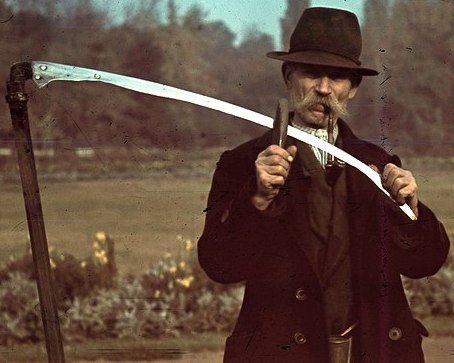
Excerpt from Hamlet Natives by Vasily Shukshin, translated from Russian
A grayhead was walking on a wet road. He was walking to mow some grass for his bossy. His hamlet behind hummocks was no longer in sight. The place he was going to was a piedmont, a vast submontane valley; foothills. Up from the next hummock he would see the whole valley. It was beset by silent mountains on three sides. Wide open, green land. People had been haymaking here for ages.
At the brows, the grass is as high as a horse's belly. Swales lie below; it’s cool down there; the dense forest smells of decaying leaves. There, clear, icy cold springs flow out of honey-coloured loam. And what delicious water it is! It’s tempting to sit there for a while, in gloom and chill, feeling lonely and somehow wistful.
***
The sun kept rising. Fog lifted up and cleared away. The ground was gently steaming; the vapours didn’t veil the light and rather seemed to carry it from earth to sky.
In spinneys, birch leaves had dried up a little but still preserved their delicate rinsed freshness and were warmly glistening. The immense morning silence was warbled through by invisible birds.
The air was warming up. Down from slopes, warmth was streaming into dank valleys; the ground was vehemently smelling of its plentiful green power.
***
Finally, here was the old man’s strip: a gently sloping dale not far from the road, and a swale, the spring-fed swamp forest, below it.
The sun was already four fingers high; he was a bit belated.
After the old man snacked with bread and half-sours, he peened the blade, then graunched it with the whetstone.
For him, scything was a work second to none. And he loved to mow alone. There are so many things one can think over in a day!
***
The old man scythed till noon, when the grass got completely dry. The sun was scorching; it felt as if someone had put a hot pancake on his head.
“Thank God!” he said, looking over the mown bald spot: he had done plenty enough. The old man was in a lighthearted mood.
He went into a small leaf hut he had built in good time, while coming to check on herbage. Now he could eat in no hurry, with gusto.
Inside the leaf hut there was strong, warm smell of dry grass. A tiny fly was buzzing shrilly somewhere; the hot silence was filled with the incessant, steady, strident chirr of grasshoppers. And silver larks glided in the sky and trilled.
***
The old man spread a clean cloth out on the grass, laid out washed green onions, cucumbers, bread... He walked down to the spring, where a bottle of milk was cooling in the water, tightly plugged with cloth. He crouched by the brook, his hands in its damp yielding bank, and drank at length, unhurriedly. He watched tiny grains of light sand chase one another on the rust-coloured bottom.
“Like live things,” thought the old man. He rose stiffly, took the bottle and went to his leaf hut.
I feel this piece needs a comment. The author of the original story, Vasily Shukshin, wrote in the so-called 'village prose' genre. The Russian text is full of dialect words, not always clear even to native speakers. I tried to preserve that in my translation, using rare or regional English words.